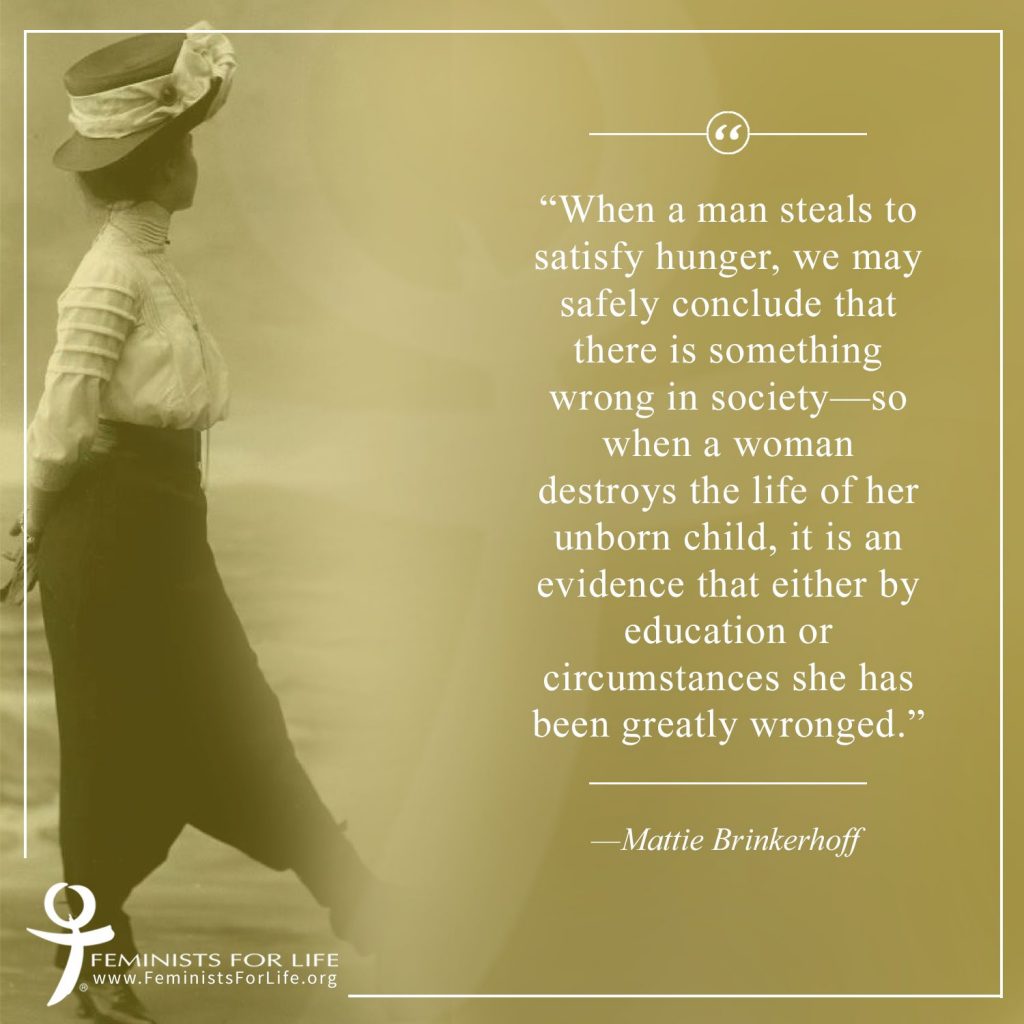
Mattie Brinkerhoff
Mattie Brinkerhoff is the author of one of the most resonant passages regarding women and abortion that have survived from the 19th century; a passage linking early feminist battles for women’s rights with that century’s debate about the persistent evils of abortion and infanticide.
“When a man steals to satisfy hunger, we may safely conclude that there is something wrong in society — so when a woman destroys the life of her unborn child, it is an evidence that either by education or circumstances she has been greatly wronged,” Brinkerhoff wrote in an 1869 essay in The Revolution, the newspaper published by more famous suffragists, Susan B. Anthony and Elizabeth Cady Stanton.
Mattie (Martha) Brinkerhoff was a popular suffrage lecturer in the American Midwest. As a young woman, she toured Kansas in 1867 with Susan B. Anthony, Elizabeth Cady Stanton, and Olympia Brown, and in 1868 began to deliver speeches on women’s suffrage in Iowa, where she had her greatest success. At the same time, Brinkerhoff sought new subscribers to Anthony’s newspaper The Revolution, to which she herself contributed articles and notes from the lecture field. In a report to the American Equal Rights Association in 1869, she said her greatest difficulty was not having enough time to accept all the invitations to speak.
According to Louise Noun’s Strong-Minded Women, the Dubuque Herald (Iowa) applauded that “Mrs. Brinkerhoff’s [discourse] was logical, not sensational but earnest and truthful. What she says will be remembered.” Yet memorable as her words were to audiences, little may be found about Brinkerhoff’s work and life in histories of women’s suffrage. She was born in Missouri and lived, at least for a time, in Illinois. She was married, a mother, and her husband accompanied her on her tour of Iowa. There is evidence that she lectured in Wisconsin. Mary Newbury Adams wrote to Amelia Bloomer that Brinkerhoff’s divorce and remarriage around 1880 caused a scandal that Adams believed “hurt our cause here [in Iowa].” Noun suggests this scandal is the reason she is so little mentioned in history books.
Among the words that will be remembered is an 1869 article Brinkerhoff wrote for The Revolution, “Woman and Motherhood.” She argued for the elimination of coercive pressures that drive women to abortion, for the right of women to refuse the sexual demands of their husbands, for the education and enfranchisement of women, for women’s custody rights; in other words, for the freedom that comes with the creation and expansion of nonviolent choices for women.
[T]he boldness with which many men blame women for the crime of infanticide without assuming themselves, in the case, a shadow of responsibility, I should think would rouse every mother, at least, to utter words in self-defence. That American women are more guilty of this practice than the women of any other nation, I do not doubt; but is there not a reason for this?
…American women… have learned it should be for them to decide when and how often they shall take upon themselves the sacred duties of motherhood, but as law and custom give to the husband absolute control of the wife’s person, she is forced to not only violate physical law, but to outrage the holiest instincts of her being to maintain even a semblance of that freedom which by nature belongs to every human soul.
When a man steals to satisfy hunger, we may safely conclude that there is something wrong in society — so when a woman destroys the life of her unborn child, it is an evidence that either by education or circumstances she has been greatly wronged. But the question now seems to be, how shall we prevent this destruction of life and health?
Mrs. [Elizabeth Cady] Stanton has many times ably answered it — “by the true education and independence of woman.”
…If we would make woman free, let us teach her the alphabet of human life, make her understand and value true womanhood. Then she will scorn to be man’s petted slave. She will scorn his smiles and courtesies, when they are proffered only as an excuse for justice.
Oh, motherhood! which our opposers say is woman’s holiest mission. We cannot have true mothers without having true womanhood first. Let us see that our daughters are developed into true women, and the office of maternity will take care of itself. Remove woman’s shackles and she will soon create a public opinion that will declare it a disgrace for a man to outrage the woman he has sworn to protect. Then, and not till then, will man’s shackles fall, for noble manhood must be the legitimate fruit of free and exalted womanhood. Brothers, ’tis for you, as well as ourselves we plead. Will you neglect so great a salvation?
Feminists for Life, like Mattie Brinkerhoff, recognizes that abortion is a reflection that our society has failed to meet the needs of women. Circumstances have changed since 1869, but pregnant women still face tremendous challenges. Frederica Mathewes-Green shared Brinkerhoff’s concerns in one of FFL’s Sisterlife newsletters: “For the question remains, do women want abortion? Not like she [sic] wants a Porsche or an ice cream cone. Like an animal caught in a trap, trying to gnaw off its own leg, a woman who seeks an abortion is trying to escape a desperate situation by an act of violence and self-loss. Abortion is not a sign that women are free, but a sign that they are desperate.”
For this reason, Feminists for Life is dedicated to systematically eliminating the root causes that drive women to abortion. Women deserve better.®
By Cat Clark
References
Louise Noun, Strong-Minded Women: The Emergence of the Woman-Suffrage Movement in Iowa (The Iowa State University Press, 1969)
Mary Krane Derr, Rachel MacNair, and Linda Naranjo-Huebl, ProLife Feminism Yesterday & Today: Expanded Second Edition (Xlibris, 2005)
The Revolution (suffragist newspaper, New York, 1868-1869)






